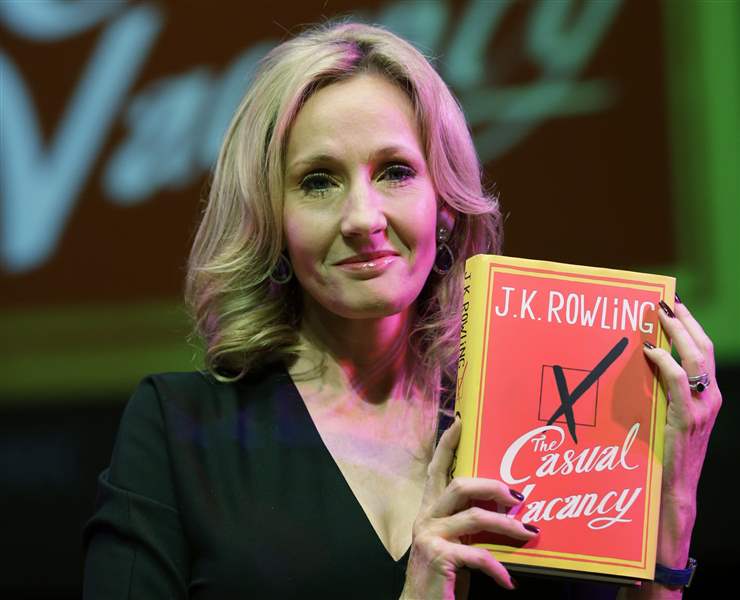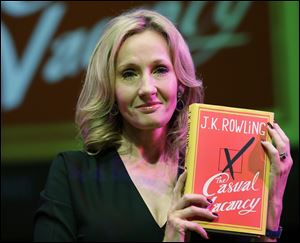
Rowling’s adult world is disappointing, dull
10/7/2012
British writer J.K. Rowling poses for the photographers with her new book, entitled: 'The Casual Vacancy', at the Southbank Centre in London.
Associated Press

British writer J.K. Rowling poses for the photographers with her new book, entitled: 'The Casual Vacancy', at the Southbank Centre in London.
With J.K. Rowling’s new novel, The Casual Vacancy, we are firmly in Muggle-land — about as far from the enchanted world of Harry Potter as we can get. There is no magic in this book — in terms of wizarding or in terms of narrative sorcery. Instead, this novel for adults is filled with a variety of people like Harry’s aunt and uncle, Petunia and Vernon Dursley: self-absorbed, small-minded, snobbish, and judgmental folks, whose stories neither engage nor transport us.
It’s easy to understand why Rowling wanted to try something totally different after spending a decade and a half inventing and complicating the fantasy world that Harry and company inhabited, and one can only admire her gumption in facing up to the overwhelming expectations created by the global phenomenon that was Harry Potter. Unfortunately, the real-life world she has limned in these pages is so willfully banal, so depressingly cliched that The Casual Vacancy is not only disappointing — it’s dull. The novel — which takes place in the tiny, fictional English village of Pagford, and chronicles the political and personal fallout created by the sudden death of a member of the parish council named Barry Fairbrother — reads like an odd mash-up of a dark soap opera like Peyton Place with one of those very British Barbara Pym novels, depicting small-town, circumscribed lives.
This is definitely not a book for children: suicide, rape, heroin addiction, beatings, and thoughts of patricide percolate through its pages; there is a sex scene set in a cemetery, a grotesque description of a used condom (“glistening in the grass beside her feet, like the gossamer cocoon of some huge grub”) and alarming scenes of violent domestic abuse. The novel contains moments of genuine drama and flashes here and there of humor, but it ends on such a disheartening note with two more abrupt, crudely stage-managed deaths that the reader is left stumbling about with whatever is the opposite of the emotions evoked by the end of the Harry Potter series.
Instead of an appreciation for the courage, perseverance, loyalty, and sense of duty that people are capable of, we are left with a dismaying sense of human weakness, selfishness, and gossipy stupidity. Instead of an exhilarating sense of the mythic possibilities of storytelling, we are left with a numbing understanding of the difficulty of turning a dozen or so people’s tales into a story with genuine emotional resonance.
As The Casual Vacancy trundles along and Rowling starts grappling with the consequences of her characters’ darker secrets, the narrative gathers momentum, but it takes a lot of pages to get there. In the meantime we are treated to tedious descriptions of the political squabbles exacerbated by Barry Fairbrother’s death and historical accounts of class tensions in insular Pagford — most notably a face-off between one faction that is opposed to a public housing project and a clinic for addicts, and another that has a sense of duty toward the less fortunate. It’s a subject with the potential to reverberate with an American audience — given the current battles between Republicans and Democrats over the role and size of government — but as laid out here it’s oddly bloodless and abstract.
In some respects The Casual Vacancy is grappling with many of the same themes as the Harry Potter books: the losses and burdens of responsibility that come with adulthood, and the stubborn fact of mortality. One of the things that made Harry’s story so affecting was Rowling’s ability to construct a parallel world enlivened by the supernatural, and yet instantly recognizable to us as a place where death and the precariousness of daily life cannot be avoided, a place where identity is as much a product of deliberate choice as it is of fate. What’s missing here is an emotional depth of field. It’s not just because the stakes in this novel are so much smaller. (In Harry Potter, the civil war was literally between good and evil; here, it is between petty, gossip-minded liberals and conservatives.) It’s that the characters in The Casual Vacancy feel so much less fully imagined than the ones in the Harry Potter epic.
We do not come away feeling that we know the back stories of the Vacancy characters in intimate detail the way we did with Harry and his friends and enemies, nor do we finish the novel with a visceral knowledge of how their pasts — and their families’ pasts — have informed their present lives. Of course, Rowling had seven volumes to map out the intricacies of the wizarding world in Harry Potter. The reader can only hope she doesn’t try to flesh out the Muggle world of Pagford in any further volumes, but instead moves on to something more compelling and deeply felt in the future.